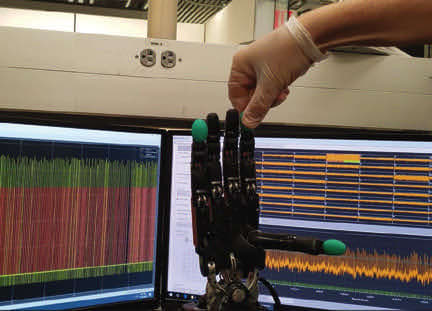
Researchers have developed a novel biohybrid neuroprosthetic research platform comprised of a dexterous artificial hand electrically interfaced with biological neural networks. The robotic and neuronal behavior of this biohybrid neuroprosthetic hand model is sensitive to different neural stimulation encoding methods and can integrate robotic tactile sensations within the motor control of an artificial hand.
This finding opens the possibility of using biohybrid research platforms in the future to study aspects of neural interfaces with minimal human risk. Ultimately, this could lead to a better understanding of the complex sensation of touch, which is necessary for refined control of the hand.
Researchers used the biohybrid model to investigate how cortical neurons could perceive robotic sensations of touch using a preclinical research platform. They used tactile sensations from the robotic fingertip to biomimetically stimulate the neurons in the multichannel microelectrode array with a rapidly adapting or slowly adapting encoding model. The evoked neuronal activity recorded from the efferent electrode was decoded to control the robotic hand.
The biological neural networks exhibited the capacity for functional specialization with the rapidly adapting or slowly adapting patterns, represented by significantly different robotic behavior of the biohybrid hand with respect to the tactile encoding method. (Image Credit: Florida Atlantic University)
For more information, visit here .



